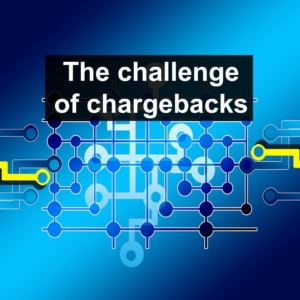 Today, we’re taking a look at chargeback management, chargeback news, challenges and trends. A new report from Vesta and Javelin Strategy & Research says sellers of digital products are particularly hard hit by chargebacks and fraud. Extramarital affairs site Ashley Madison gets $17.5 million fine for 2015 data security breach.
Today, we’re taking a look at chargeback management, chargeback news, challenges and trends. A new report from Vesta and Javelin Strategy & Research says sellers of digital products are particularly hard hit by chargebacks and fraud. Extramarital affairs site Ashley Madison gets $17.5 million fine for 2015 data security breach.
With 51% of purchases now made online, businesses need to implement stronger and more innovative verification systems according to James Blake, founder of Hello Soda. More than $500,000 in chargeback reimbursements is owed to St. Lawrence County by the state of New York for students attending the Fashion Institute of Technology.
David DeCorte looks at the pros and cons of in-house versus outsourced chargeback management services. While in-store apps help retailers sell, they sometimes lead to buyer’s remorse and chargebacks. SE Asia’s GrabPay wrestles with the challenge of chargebacks and fraud with the proliferation of new contactless payment systems.
Understanding and Combatting E-commerce Fraud
 It’s the busiest shopping period of the retail calendar but this year, e-commerce merchants are facing not only all the usual stresses of the holidays: they’re also facing a rising flood of fraud. Since the EMV liability shift, these merchants are enduring more fraud losses and higher fraud management costs than ever before, according to a new report from Vesta and Javelin Strategy & Research.
It’s the busiest shopping period of the retail calendar but this year, e-commerce merchants are facing not only all the usual stresses of the holidays: they’re also facing a rising flood of fraud. Since the EMV liability shift, these merchants are enduring more fraud losses and higher fraud management costs than ever before, according to a new report from Vesta and Javelin Strategy & Research.
Retailers who sell digital goods – media, games, tickets and services – are hardest hit. Reasons for this include the short time window between payment and delivery, the difficulty of verifying legitimate purchasers online and the ease with which criminals can resell digital goods online.
The numbers on e-commerce fraud are eye-opening. In 2016, fraud and chargeback management (including operational costs for personnel) accounted for 23% of the operational budgets for digital goods merchants, and fraud costs ate up 8.6% of their annual revenue. This reflects the fact that 49% of chargeback losses originate from online channels, which is three times the amount of in-person fraud. Via multichannelmerchant.com
Affair site Ashley Madison will pay $1.6M fine for 2015 breach
 The parent company of AshleyMadison.com — the extramarital dating service that suffered a massive data breach last year — will pay $1.6 million to settle Federal Trade Commission (FTC) and state charges that it mislead consumers about its privacy practices. The FTC and the New York attorney general made separate announcements about the deal on Wednesday.
The parent company of AshleyMadison.com — the extramarital dating service that suffered a massive data breach last year — will pay $1.6 million to settle Federal Trade Commission (FTC) and state charges that it mislead consumers about its privacy practices. The FTC and the New York attorney general made separate announcements about the deal on Wednesday.
Ashley Madison’s parent company, Ruby Corp., agreed to a $17.5 million fine, though 90 percent of the amount was suspended due to inability to pay.
Ruby will also be required to increase security on its sites.
Ashley Madison’s website boasted icons claiming a security award and certification that both appear to have been made up. The breach exposed information on 37 million users, including many who had purchased a $19 “full delete” option after closing an account. Via thehill.com
Cutting chargebacks with big data verification
 A massive 51% of purchases are now made online, with that statistic being much higher in younger populations. We are at a stage where consumer behaviour is in limbo between the online world and the offline world, and the increasing demand for convenience and efficiency means that it is essential for businesses to implement more efficient and innovative verification systems – soon.
A massive 51% of purchases are now made online, with that statistic being much higher in younger populations. We are at a stage where consumer behaviour is in limbo between the online world and the offline world, and the increasing demand for convenience and efficiency means that it is essential for businesses to implement more efficient and innovative verification systems – soon.
Many young consumers, including millennials, and even more so Generation Z, have grown up with technology at their fingertips, and the ability to get whatever they want with a click of a button.
63% of millennials with a smartphone already use it to make purchases, compared to 44% of other generations, highlighting the huge appetite for online shopping when it comes to younger consumers. With the value of contactless payments in 2016 reaching $9 billion back in August, the growing demand for a seamless user journey is evident. Via paymenteye.com
Social Media In-App Shopping Boosts E-commerce Earning Potential
 We generally think of reducing e-commerce friction as a good thing, but some measure of friction is useful to prevent consumers from clicking “buy” before they’ve had a chance to fully justify the purchase. When consumers experience buyer’s remorse, many are tempted to request illegitimate chargebacks to reverse the transactions, a practice known as friendly fraud.
We generally think of reducing e-commerce friction as a good thing, but some measure of friction is useful to prevent consumers from clicking “buy” before they’ve had a chance to fully justify the purchase. When consumers experience buyer’s remorse, many are tempted to request illegitimate chargebacks to reverse the transactions, a practice known as friendly fraud.
At present, chargebacks cost merchants as much as $40 billion annually, with up to 86% of all chargebacks being the product of friendly fraud. This is already a serious challenge, and encouraging consumers to act even more impulsively when shopping online will only further exacerbate the problem. Via multichannelmerchant.com
State owes St. Lawrence County nearly $500,000 in chargebacks for student tuition to Fashion Institute of Technology
 There is also a two-year lag for the community college chargebacks, which means the county is sending the funding to the colleges well before it receives payments from the towns.
There is also a two-year lag for the community college chargebacks, which means the county is sending the funding to the colleges well before it receives payments from the towns.
The annual cost of community college chargebacks keep escalating, raising the ire of county legislators who believe those fees are unfunded mandates the county and towns cannot afford.
Mr. Acres said it’s hypocritical for the state to force towns and counties to pay community college tuition payments when the state isn’t providing its share of reimbursement. With the availability of online courses, he said he believes the law is outdated. Via watertowndailytimes.com
The Big Question: In-House or Outsourced Fraud Prevention?
 Leveraging available resources to optimize your fraud prevention efforts is an essential step in scaling your organization. But what is the “optimal” approach? Is it better to build an in-house fraud prevention team, or will you see better long-term results by outsourcing?
Leveraging available resources to optimize your fraud prevention efforts is an essential step in scaling your organization. But what is the “optimal” approach? Is it better to build an in-house fraud prevention team, or will you see better long-term results by outsourcing?
“Building” Versus “Buying” Your Solution
First, let’s point out that there is not one absolute answer to this question—there are “pros” and “cons” to each approach. Those who favor in-house fraud management, for example, suggest it is more cost-effective and allows merchants to tailor their approach to the needs of their own business. Not only that, but in-house teams have a more intimate understanding of the dynamics and particularities of the business, giving them greater insight into how the organization operates.
With outsourced solutions, however, costs are more transparent, allowing merchants direct insight and providing a clearer picture of their situation and where processes can still be made more efficient. Plus, because in-house teams scale alongside their business, they will inevitably be caught off-guard by sudden, unanticipated spikes in fraud instances. Via crowdreviews.com
Grab: Cashless payments could cause increased chargebacks in 2017
 As we approach 2017, we anticipate two major trends that may impact Grab’s business in our region — chargebacks and declines linked to syndicated fraud. Chargebacks are not a new trend for many companies. However, for Southeast Asia, as more businesses embrace cashless payments, we expect its proportion to increase if we do not stay vigilant. Syndicated fraud is also getting more sophisticated, organised and localised in origin – there is a higher ability to quickly execute many fraudulent transactions in rapid succession that results in declines and bad debt. Grab is placing more active safeguards to screen our transactions.
As we approach 2017, we anticipate two major trends that may impact Grab’s business in our region — chargebacks and declines linked to syndicated fraud. Chargebacks are not a new trend for many companies. However, for Southeast Asia, as more businesses embrace cashless payments, we expect its proportion to increase if we do not stay vigilant. Syndicated fraud is also getting more sophisticated, organised and localised in origin – there is a higher ability to quickly execute many fraudulent transactions in rapid succession that results in declines and bad debt. Grab is placing more active safeguards to screen our transactions.
From a compliance point of view, working with separate local regulators to launch an ambitious regional payments product roadmap can be a key challenge. Regulations and compliance processes can differ hugely from one jurisdiction to another, and that’s something we are very focused on which requires significant investment and time. We ultimately want to safeguard our reputation as a trusted and safe brand. Fortunately, Grab has been working closely with regulators and governments from day one and will continue to do what it takes to be a responsible partner in society. Via thepaypers.com








LET’S CONNECT